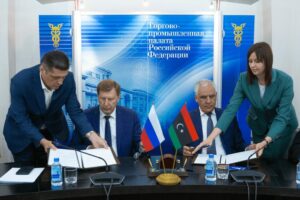Peter Waiswa was working as an assistant district health officer and a physician for Uganda’s Ministry of Health when he heard about an intriguing opportunity: a chance to earn a PhD in public health through a joint programme sponsored by Makerere University in Kampala and the Karolinska Institute in Stockholm. The programme, funded primarily by the Swedish government’s International Development Cooperation Agency, aimed to support Uganda’s development by investing in a new generation of scientists. “Most PhDs focus on the individual, but in this programme, the focus was on building institutional capacity at Makerere,” Waiswa says. “The research you do was also meant to be aligned to national development priorities.”
The opportunity to gain exposure to a new culture and education system appealed to Waiswa, who already had a master’s degree in public health. In 2006, he applied and was accepted. He spent three months in each year of the four-year programme in Sweden, and worked jointly with one Ugandan and two Swedish supervisors to hone his doctoral research on health systems and policy in Africa. His intention, Waiswa says, was always to remain in Uganda and contribute to his country’s science and public-health programmes.
While enrolled, he got a job with Makerere University, where he founded and now coordinates the Centre of Excellence for Maternal Newborn & Child Health, which aims to promote evidence-based policymaking and health-care interventions for mothers and newborns in Uganda and neighbouring countries. Still a visiting researcher at the Karolinska Institute, he publishes at least a dozen papers each year, supervises several master’s and PhD students at Makerere and has brought in more than 30 grants totalling more than US$20 million. Waiswa’s affiliation with the Karolinska, the experience he gained in Sweden and his international professional network have all helped him to achieve personal success, he says, and have benefited Makerere and Uganda more generally, too.
“Do these programmes advance Africa’s agenda? I think they do,” Waiswa says.
Most African universities have plenty of staff with master’s-level qualifications but few with a PhD, says Pauline Essah, director of research and programmes at Education Sub Saharan Africa (ESSA), a non-profit organization registered in the United Kingdom and Ghana that promotes high-quality education in sub-Saharan Africa. The continent needs another one million doctoral scholars to catch up with the international average for researchers per capita (see go.nature.com/3ixvjyt), and Africa’s dearth of PhD holders is already creating a bottleneck in training new scholars to fill this need. “Universities are where you should be generating knowledge and coming up with solutions to major problems, but we are massively short” of the expertise needed, Essah says. “Economies and countries in Africa suffer as a result.”
That’s where split-site PhD programmes such as the one Waiswa participated in can be crucial. By “tapping into expertise, mentorship and supervision from outside the continent”, such programmes can help to “get our PhD numbers up to the level where they’re eventually self-sufficient,” Essah says.
These programmes usually aim to build overall research capacity in Africa because, by design, they encourage students to stay in their home countries and get an academic, civil society or government job that allows them to conduct locally relevant research. “We don’t remove people from their home setting by putting them in the US or UK for a few years, by the end of which they’re estranged from their home environment,” says Stefan Swartling Peterson, a physician and global-health researcher at the Karolinska Institute, who was Waiswa’s PhD supervisor.
The institute, Waiswa points out, also benefits from the partnership. Its faculty members are able to bring in extra funding through joint proposals with Makerere colleagues, and Karolinska academics and students can easily collaborate with Makerere scholars and obtain access to field sites in Uganda. “Their professors and students get exposure to real-world issues,” Waiswa says. The partnership has also improved the Karolinska’s “credibility and visibility and impact, especially in global health”.
Despite the pluses for both sides, there are not enough of these programmes to meet demand in Africa, and those that do exist tend to be tethered to the funding whims of Western governments or institutions. New split-site PhD programmes that Sweden was developing with Rwanda and Tanzania, for example, are now “on the chopping block”, Peterson says, owing to national budget cuts. But failure to support Africa’s ability to conduct research and innovate on its own is short-sighted, he says, and will cost the world more in the long run.
No single model
Split-site PhDs are sometimes referred to as joint, double or sandwich degrees, and every programme is different. Some are aimed at recent master’s graduates, whereas others are specifically designed for university academics or government employees who do not have a PhD. In some split-site programmes, those who already have a professional position can keep their job, increasing the chances that they will remain in their country after graduating.
Although these programmes are usually supported by Western governments, organizations or universities, they are often established by researchers from partner institutions who are already working together, or academics with knowledge of both countries involved. Bernt Lindtjørn, a public-health researcher at the University of Bergen in Norway, chose Hawassa University in Ethiopia as the focus for a joint programme that he helped to establish at Bergen (one now funded by the Norwegian government) because he was born in Ethiopia and had worked there as a physician. Likewise, Peterson helped to launch the collaboration between Makerere University and the Karolinska Institute after conducting research at Makerere himself.
Some split-site PhDs result in a joint degree conferred by both partner universities; others award a PhD from one institution. There is no standardized formula for what the programmes themselves entail. Some require equal time to be spent at both institutions, whereas others involve a shorter stint abroad to take a few courses, access resources — such as laboratories, libraries and computational facilities — and analyse results. Some don’t require African students to travel at all, and instead send academics from the partner institution to Africa or make courses available online.
Women, especially, can benefit from programmes that do not involve a heavy travel component, Essah says, because long periods away from their families might discourage them from applying in the first place. Some of the split-site programmes that Essah was involved in setting up and running from 2009 to 2018, involving the University of Cambridge, UK, and several African universities, included an optional mid-programme break for women with young children. “That’s another plane ticket you have to purchase, but it ensures women who have caregiving duties can go and see how their children and families are doing,” she says.

Hiwot Abera Areru says she chose to enrol in the split-site PhD programme in public health at Hawassa University — where she is now an assistant professor — and the University of Bergen, specifically because of the limited time she would be required to spend in Norway. “I was in the middle of establishing my own family,” she says. “I preferred this joint PhD because of the prestigiousness of the University of Bergen over local universities, but also because it would have been difficult for me to go totally abroad.”
Areru spent just two months in Norway, but thanks to the relationships she made there, she’s now undertaking a joint postdoc, also split between Hawassa and Bergen. “Joint programmes should be implemented in all universities in Africa,” Areru says. “We need more of them, especially for females who need to be near their families but also want to fulfil their career ambitions.”
Obstacles to success
Split PhD programmes are not without shortcomings. For starters, few of them exist. Often, says Essah, organizations “would rather fund three master’s-level scholarships than fund a PhD”.
It can be difficult, too, to find those split-site PhD programmes that do exist. No centralized database compiles or compares them, so potential students often depend on word of mouth or their own initiative. Essah and her colleagues at ESSA are trying to fill this gap with a scholarship hub that lists vetted opportunities for African students, including split-site PhDs. The news organization Al-Fanar Media compiles a similar list of opportunities open to students in North African countries.
Students who wish to enrol in one of these programmes usually need to attend an African university that specifically offers such a partnership, although some exceptions do exist. For example, the UK Foreign, Commonwealth and Development Office sponsors split-site scholarships for PhD students from low- or middle-income countries that are members of the Commonwealth of Nations — including 20 in Africa — to conduct research for 12 months at a UK university.
Limitations exist, too, in the type of PhDs offered on these programmes. Usually, they focus on addressing social needs, meaning that opportunities are more plentiful in fields such as public health, agriculture and engineering than in, say, astronomy, particle physics or wildlife biology. Language can also limit the scope of classes that PhD students can take, Waiswa says. Academics at the Karolinska Institute, for example, taught public-health classes in English but most other subjects in Swedish.
The logistics can be daunting as well. It’s usually up to students to find their own supervisors at both locations, and they can also face difficulties in trying to meet the requirements of two cultures and institutions. “Sometimes, you wind up doing more work than other students,” Waiswa says.
Some split-site PhDs require faculty members at African universities to continue teaching while they pursue their doctorate, and these programmes might not provide any extra funding, on top of their salary, to cover living expenses. Often, in such cases, “PhDs are not completed in time because the candidates can’t focus just on their research,” says Beate Schindler-Kovats, director of the Nairobi office of the German Academic Exchange Service. Schindler-Kovats sees just three or four applications per year for split-site PhDs in Germany, she says, because “the incentives are not good enough” to compete with just doing a PhD abroad.
Academics who want to create split-site PhD programmes frequently face challenges, too. Trying to get everyone on the same page about academic credits and scholarly standards is “a total nightmare”, says Dan Haydon, director of the Glasgow Centre for International Development at the University of Glasgow, UK. Haydon and his colleagues in the School of Biodiversity, One Health and Veterinary Medicine tried for years to set up a split-site master’s programme with an African university but were ultimately unsuccessful. Unless an external funder steps in, he says, Western universities are usually reluctant to invest time and effort in creating a programme that won’t be a major source of income in the short term.
Quality-control concerns can also be an issue. The University of Bergen, for example, pushed back at first on Lindtjørn’s idea of conferring a degree jointly with an Ethiopian university, because administrators at Bergen could not directly control standards at the partner institution. Lindtjørn reassured them that graduates would have to satisfy all the requirements of any Norwegian institution. “It’s the same, identical game, and thereby we kept the quality,” he says.
Others have found more-creative workarounds. Tom Kawula, director of the Paul G. Allen School for Global Health at Washington State University in Pullman, pushed for six years to set up a joint PhD programme in biomedical sciences with the University of Nairobi, but struggled to get around the “roadblock” of having to make a one-to-one comparison between courses in the United States and Kenya, he says. The solution finally arrived when he and his colleagues realized that rather than requiring a “specific checklist” of perfectly transferable courses, they could instead focus on scholarly outputs, such as the requirement that students publish two first-author papers in high-quality journals. “That was the biggest break in the dam,” he says, and the joint programme is now set to launch in August.
Reciprocal benefits
Split-site PhDs are often touted as a way to prevent the brain drain in Africa, but the goal shouldn’t be to make sure every student returns home, Essah says. “Sometimes diaspora Africans are given a hard time and are told ‘You should be back in Africa,’” she says. “But the reality is, we cannot all be in Africa, and it’s a personal choice.”
Sometimes, other factors make the choice for scientists. Eskindir Loha Shumbullo, for example, is an Ethiopian scholar who got his PhD in epidemiology at the University of Bergen in 2013. He returned to his job at Hawassa University, where he helped to launch the split PhD programme with Bergen. But when ethnic-based violence broke out in Ethiopia in 2018, Eskindir was forced to look for a job abroad. He ended up back at the University of Bergen as a postdoc. “This postdoc position is kind of downgrading my status,” he says. “But I came to Norway for the sake of peace.”
No single organization seems to track what happens to split-site PhD scholars throughout their careers, which is something Essah says needs to change. “A lot of this data and information is just sitting on funders’ computers,” she says. However, anecdotal numbers suggest that these programmes do seem to be effective at building and retaining talent in Africa. Waiswa says that about 90% of the 34 scholars who graduated from his programme remained in Uganda, and almost all of the 100-plus split-site PhDs and postdocs that Essah supported through the University of Cambridge’s programmes are back in Africa. Most are conducting research, Essah says, and some have become heads of departments, faculties or universities.
More Western universities and governments should recognize, too, that the benefits of these programmes are about more than the individual researchers themselves, Haydon says. Such partnerships foster opportunities for collaborative research that will advance knowledge and solve problems in and beyond Africa. “This isn’t a charitable thing, this is about getting the research done right,” Haydon says. “The rewards are absolutely massive, and it’s really sad that it’s so hard for university managers to see that.”
There are signs that Africa is starting to take the lead in establishing and supporting these partnerships. In 2015, a coalition of African governments created the Regional Scholarship and Innovation Fund, which supports split-site PhD programmes aimed at training high-quality doctoral students and raising the calibre of African research. As the first pan-African science fund of its kind, it exemplifies the continent’s increasing commitment to fostering growth and development through science and innovation. “African governments are seeing the need for PhD-level expertise,” Essah says.
The fund, which receives support from the World Bank and some countries outside Africa, for now focuses on five priority areas: food security; energy; mining, mineral and materials engineering; information and computer technology; and climate change. Since 2018, it has supported more than 250 African scholars in science, technology, engineering and mathematics, and thousands more have applied — a testament, Essah says, to the interest in these programmes and “the reality” that the world needs more of them.
Source : Nature















